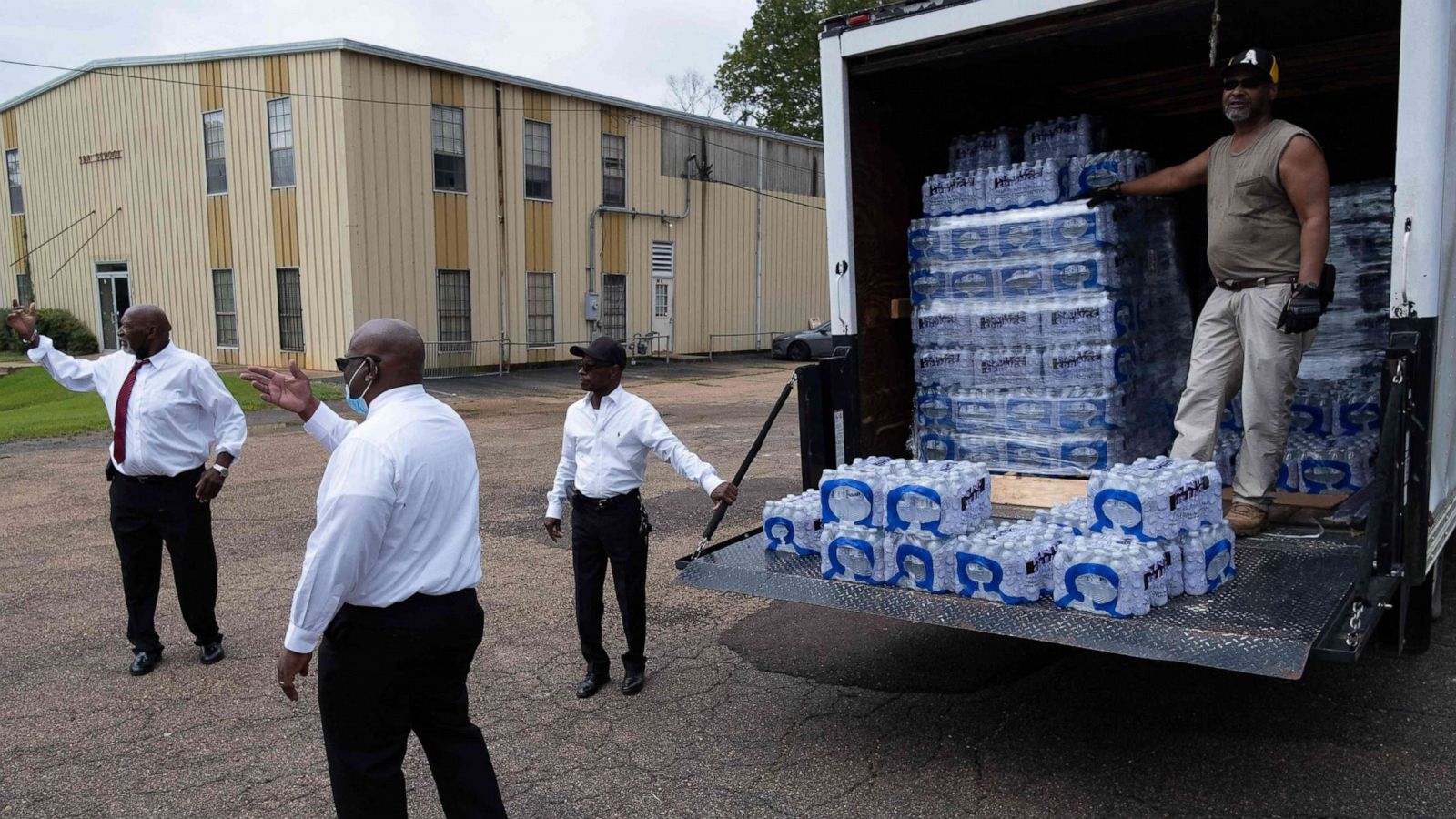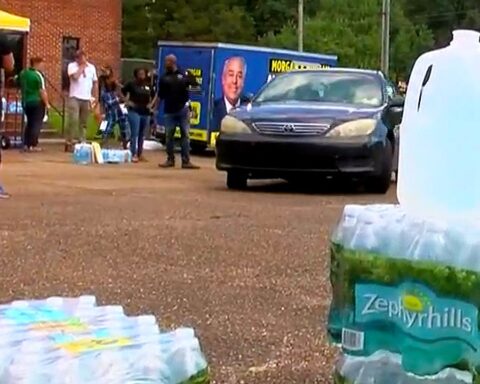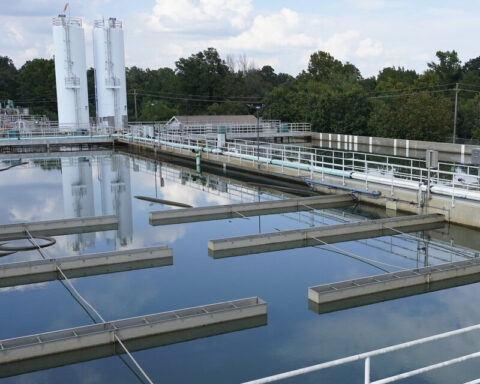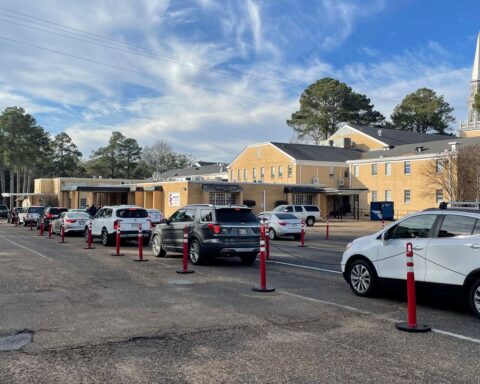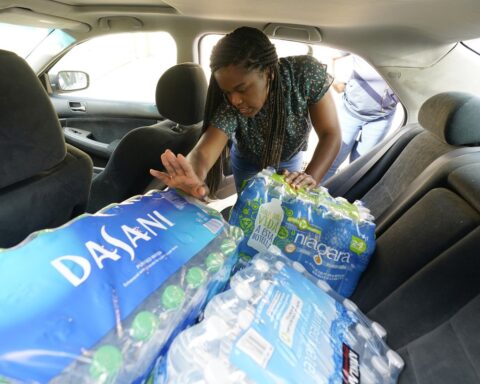By Katherine Knott
Thomas Hudson, president at Jackson State University, had hoped to kick off this academic year by celebrating a large freshman class, record fundraising, new programs and the football team’s quest to defend its national championship.
He set those thoughts aside after the Pearl River, which runs through Jackson, Miss., flooded and knocked the city’s water treatment plant off-line Aug. 29—leaving the city of more than 150,000 without safe tap water and extremely low water pressure for about a week. Jackson State and two of the area’s other colleges and universities moved classes online as a result, brought in portable showers and restrooms, and provided students and staff with bottled drinking water, Mississippi Today reported. The city had already been under a boil-water notice for more than a month.
This was not the first time Jackson State had to quickly improvise to respond to a water emergency. The university relies on an aging and dilapidated city water system that’s been plagued with problems for more than a decade. The crisis reinforced the need for the university to build its own water system, something administrators have discussed for several years. Hudson said the university, which has lobbied state lawmakers for funds for such a project, is planning to conduct a feasibility study to determine whether such a project is possible and the associated costs.
“This is going to be a difficult process, but it’s a necessary step that we have to take in light of the long-term issues the city has been facing as it relates to water,” he said.
Nearby Millsaps College already has plans drawn up to drill two wells on campus and build a 150,000-gallon water tank. Fundraising currently is underway for the estimated $4.1 million project. The private college of nearly 700 students started drafting plans for the project after an ice storm in 2021 shut off the water for two weeks.
“This is a critically important project for our campus,” Millsaps president Rob Pearigen said in a news release. “We simply must provide this most basic service to our students, faculty and staff.”
Belhaven University, a private institution with more than 4,000 students, said in a message to the campus that the neighborhood where the campus is located hasn’t experienced the same severe water problems seen in other parts of Jackson.
Jackson State’s more than 7,000 students resumed in-person classes today, though Hudson said some have left because of the crisis, but he’s not sure how many.
“But it is clear that we did have some students, anecdotally, who did make other decisions based on some of the issues we’re having here,” he said.
Jackson State was set to start the year with about 1,300 first-time freshmen this year, a 35 percent increase from the previous year.
Dawn McLin, a psychology professor at Jackson State and president of the Faculty Senate, said the university and faculty were ready to meet the challenge of supporting students and responding to the situation, which has caused uncertainty for some students.
“Despite having shown great resolve to this point, everyone, especially young people, may have grown tired of the uneasiness that surrounds the water crisis,” she wrote in an email. “My heart goes out to them and their families for all these adjustments that needed to be made in the first few weeks of school.”
She said she makes sure to check with students about their mental health. Some have told her that they aren’t happy and are worried about what future health issues might arise from drinking the water.
“Many are stressed,” she wrote. “One student stated, ‘I have been traumatized since I got here … with Covid, Monkeypox and now the water crisis. I feel like college is not real. I am mentally checked out. All of this has taken place for two years, since I was a freshman.’”
McLin said the Faculty Senate has called for an independent water source on campus for the last two years.
“We will continue to advocate that the University make improvements to safety, and facilities and operations on this campus surrounding emergency preparedness,” she wrote.
She added that Jackson State faculty members have coped well with the water woes, which are only the latest challenge with which they’ve had to contend.
“We have been through quite a few changes in recent years, from changes of administration, deferred maintenance, budget cuts, and a worldwide pandemic which effectively shut the entire world down for some time,” she wrote. “Yet, we remain and we have continued to support our students’ intellectual growth and learning trajectory.”
Madison Cathey, president of the Student Government Association, said the water crisis has affected but not hurt academic performance or her overall experience at Jackson State.
“It’s disappointing more than anything,” said Cathey, a senior studying accounting. “Water is a basic necessity in life. To wake up and not have water running is really disappointing.”
The student government worked to set up a town hall with university administrators to keep students up-to-date about the outage.
“It’s not our first rodeo with having little to no water pressure or a boil-water notice,” she said.
Before the river flooded, low water pressure three weeks ago forced Jackson State to delay move-in for students living on campus by a few days.
Cathey said the water problems have been ongoing during her time at Jackson State, and she wants the university to build its own water source. But she also wants Jackson residents to have consistent access to safe, clean drinking water.
“I’m saddened to see this urban area of more than 100,000 experiencing this,” she said.
Some students responded to the crisis by getting involved in the community. The Mississippi Student Water Crisis Advocacy Team formed to deliver bottled water to elderly residents, those who have disabilities or those who don’t have a car, junior Maisie Brown wrote in an online op-ed in Essence magazine.
Other students drew attention to their situation by sharing videos of life in the dorms. In one TikTok video, Jayden Mack showed his makeshift shower—a Gatorade jug taped to the showerhead so he could wash with bottled water. State officials told Jackson residents last week to close their mouths while showering, local media reported.
In other videos, he showed sinks and showers with dry faucets.
“There’s a big misconception that this is an HBCU thing,” he said in another video. “Y’all can stop saying it’s a [predominantly white institution] thing. When your city doesn’t have clean water, you have to improvise. This isn’t just an HBCU thing. Yes, all HBCUs have problems, but what school doesn’t?”
Hudson said the water crisis hampered plans for the fall semester, but he’s hopeful the university can move past it and resume normal operations.
“When you’re talking about basic services and basic needs, you expect to have that; it’s not even expected to be a part of the conversation,” Hudson said. “Hopefully going forward, we can talk about the other things the campus needs in terms of the residence halls, building the safety infrastructure around campus and really remaking Jackson State.”

